Category Archives: AI
How to Print Unique Values in Pandas Dataframe Columns

A quick post representing code sample on how to print unique values in Dataframe columns in Pandas. Here is a data frame comprising of oil prices on different dates which column such as year comprising of repeated/duplicate value of years. In the above data frame, the requirement is to print the unique value of year column. Here is the code for same. Note the method unique()
Pandas – How to Concatenate Dataframe Columns

Quick code sample on how to concatenate the data frames columns. We will work with example of Boston dataset found with sklearn.datasets. One should note that data frames could be concatenated by rows and columns. In this post, you will learn about how to concatenate data frames by columns. Here is the code for working with Boston datasets. First and foremost, the Boston dataset will be loaded. Once loaded, let’s create different different data frames comprising of data and target variable. This above creates two data frames comprising of data (features) and the values of target variable. Here are the snapshots. Use the following command to concatenate the data frames. …
Difference between Machine Learning & Traditional Software
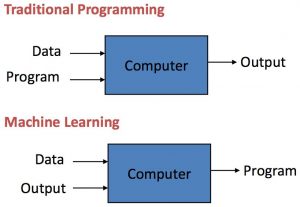
In this post, we will understand what are some of the key differences between machine learning models and traditional/conventional software. S.No Traditional Software Machine Learning 1 In traditional software, the primary objective is to meet functional and non-functional requirements. In machine learning models, the primary goal is to optimize the metric (accuracy, precision/recall, RMSE, etc) of the models. Every 0.1 % improvement in the model metrics could result in significant business value creation. 2 The quality of the software primary depends on the quality of the code. The quality of the model depends upon various parameters which are mainly related to the input data and hyperparameters tuning. 3 Traditional software …
Neural Network Architecture for Text-to-Speech Synthesis
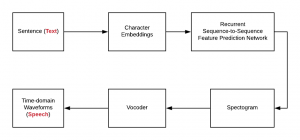
In this post, you would learn about a neural network reference solution architecture which could be used to convert the text to speech. The neural network solution architecture given in this post is based on deep learning (autoencoder network (encoder-decoder) with attention). Neural Network Reference Architecture for Text-to-Speech Synthesis In the solution architecture diagram (figure 1) depicted below, the following is described: Sentences are first converted into character embeddings. Character embeddings are numeric representations of words. Numeric representations of each of the words could be used to create numeric representations of higher-level representations like sentences/paragraphs/documents/etc. Character embeddings are next fed into recurrent sequence-to-sequence feature prediction network with attention. The sequence-to-sequence …
Reverse Image Search using Deep Learning (CNN)

In this post, you will learn about a solution approach for searching similar images out of numerous images matching an input image (query) using machine learning / deep learning technology. This is also called a reverse image search. The image search is generally searching for images based on keywords. Here are the key components of the solution for reverse image search: A database of storing images with associated numerical vector also called embeddings. A deep learning model based on convolutional neural network (CNN) for creating numerical feature vectors (aka embeddings) for images A module which searches embeddings of an input image (query) from the image database based on the nearest neighbor …
Why Data Scientists Must Learn Statistics?
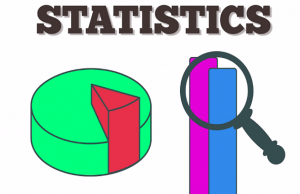
In order to understand the need for data scientists to be very good at the statistical concepts, one needs to clearly understand some of the following: Who are data scientists? What is the need for statistics in data scientists’ day-to-day work? Who are Data Scientists? Data Scientists are the primarily Scientists who do experiments to find some of the following: Whether there exists a relationship between data Whether the function approximated (machine learning or statistical learning model) from a given sample of data could be generalized for the entire population In case there are multiple function approximations for predicting outcomes given a set of input, which one of the function approximation …
When not to use F-Statistics for Multi-linear Regression
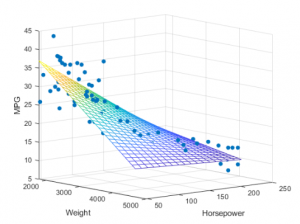
In this post, you will learn about the scenario in which you may NOT want to use F-Statistics for doing the hypothesis testing on whether there is a relationship between response and predictor variables in the multilinear regression model. Multilinear regression is a machine learning / statistical learning method which is used to predict the quantitative response variable and also understand/infer the relationship between the response and multiple predictor variables. We will look into the following topics: Background When not to use F-Statistics for Multilinear Regression Model Background F-statistics is used in hypothesis testing for determining whether there is a relationship between response and predictor variables in multilinear regression models. Let’s consider …
Machine Learning – Cloud-native Model Deployments
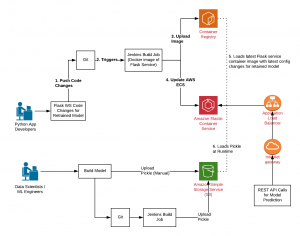
In this post, we are going to learn about the cloud-native machine learning model deployments. Cloud-native Deployments First and foremost, let’s understand the meaning of cloud-native deployments? If we are building an application or a service and we can deploy this application or the service on any cloud platform without much ado, it could be said as cloud-native deployment. And the way it is made possible is through the container technologies such as Dockers. What basically is required to be done is to wrap the applications or the services within the containers and move the containers images onto the cloud services such as AWS ECS, AWS EKS or Google Kubernetes …
What, When & Why of Regularization in Machine Learning?
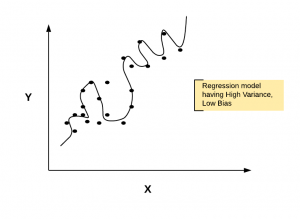
In this post, we will try and understand some of the following in relation to regularizing the regression machine learning models to achieve higher accuracy and stable models: Background What is regularization? Why & when does one need to adopt/apply the regularization technique? Background At times, when one is building a multi-linear regression model, one uses the least squares method for estimating the coefficients of determination or parameters for features. As a result, some of the following happens: Often, the regression model fails to generalize on unseen data. This could happen when the model tries to accommodate for all kind of changes in the data including those belonging to both …
Unit Tests & Data Coverage for Machine Learning Models

This post represents thoughts on what would it look like planning unit tests for machine learning models. The idea is to perform automated testing of ML models as part of regular builds to check for regression related errors in terms of whether the predictions made by certain set of input data vectors does not match with expected outcomes. This brings up some of the following topics for discussion: Why unit testing for machine learning models? What would unit tests for machine learning models mean? Data coverage or code coverage? Why unit testing for Machine Learning models? Once a model is built, the challenge is to monitor the performance metrics of the models …
Machine Learning Cheat sheet (Stanford)
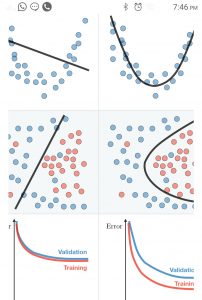
Here is a great set of cheat sheet on some of the following topics: Supervised learning Unsupervised learning Deep learning Probability and statistics Linear algebra Tips and tricks including performance metrics https://stanford.edu/~shervine/teaching/cs-229/ Hope you liked the cheat sheets on different topics of machine learning and data science.
Machine Learning Models used in Facebook
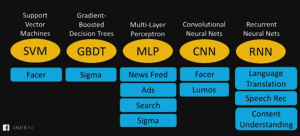
This post quickly represents machine learning projects and related machine learning models. The above diagram represents the usage of the following learning algorithms: Support Vector Machines (SVM) Gradient-boosted decision trees Multi-layer Perceptron (MLP): Used for ranking and personalizing news feeds, ads, search etc. Convolutional neural networks (CNN): Recurrent neural networks (RNN): Used for language translation, speech recognition, content understanding References
13 Programming Languages used for Machine Learning
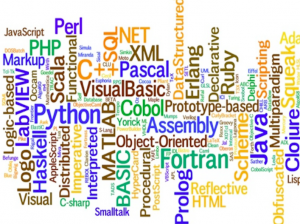
In this post, you will learn about different programming languages which can be used to create (train) machine learning models to solve supervised and unsupervised learning problems. Here are the top 13 programming languages used for machine learning: R Language: R is one of the most popular programming language and environment for statistical computing and graphics. Python: There are some of the following Python libraries which makes it easy to create machine learning/deep learning models: Scikit-learn library (Classical machine learning models): Packages such as NumPy, SciPy, Pandas are very useful and helpful in creating supervised and unsupervised learning models. Deep learning models using python libraries provided by Tensorflow, PyTorch, Theanos, CNTK, …
Top 5 Machine Learning Introduction Slides for Beginners
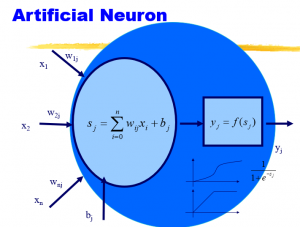
In this post, you will get to know a list of introduction slides (ppt) for machine learning. These slides could help you understand different types of machine learning algorithms with detailed examples. One or more slides from the following list could be used for making presentations on machine learning. If you are looking out for topics to be included in the machine learning course for your internal training purpose in your organization, the details presented below might turn out to be very helpful. If you are starting on learning data science, these could be good slides. Machine Learning Overview Machine Learning: An Overview: The slides present introduction to machine learning …
Andrew NG Machine Learning Coursera Videos
In this post, you will get to know the list of Andrew NG Machine Learning Coursera Videos. Here is the information: Youtube playlist of machine learning videos which are same as that of Andrew NG machine learning course on Coursera. One could use Internet Download Manager (IDM) to download these videos. Use Coursera-dl script found on Github to download the machine learning course. The script makes it easier to batch download lecture resources (e.g., videos, ppt, etc) for Coursera classes. Given one or more class names and account credentials, it obtains week and class names from the lectures page, and then downloads the related materials into appropriately named files and directories. Use AcademicTorrents website …
MIT OCW Machine Learning Courses Information
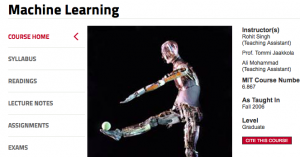
In this post, you get the information related to MIT OCW machine learning course from MIT OpencourseWare (OCW). They use Matlab as the primary programming environment. The documentation for Matlab could be found on this page, Matlab Documentation. The course is provided by Electrical Engineering and Computer Science department. Other related courses which could be useful for data scientist / machine learning engineers are some of the following: Introduction to probability (Video lectures, Lecture notes) Introduction to computational thinking and data science (Video lectures, Lecture notes) Lecture Notes – Machine Learning Course Lecture notes could be found on the following topics: Introduction, linear classification, perceptron update rule (PDF) Perceptron convergence, generalization (PDF) …

I found it very helpful. However the differences are not too understandable for me